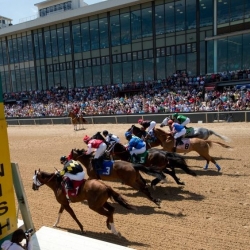
The lawsuit claims the Issue 4 ballot measure is deceptive because it does not mention Oaklawn and Southland Racing as potential beneficiaries.
A lawsuit by an Arkansas political action committee (PAC) wants the Arkansas Supreme Court to remove Issue 4 from the 2018 midterm ballot. The referendum is one of five statewide measures that Arkansas voters will decide on November 6 involve casino gambling initiatives.
Four members of the anti-casino PAC, Ensuring Arkansas’ Future, are the plaintiffs in the lawsuit. Scott Trotter, an attorney from Little Rock, filed the lawsuit on behalf of the four plaintiffs. Arkansas Secretary of State Mark Martin is named as the defendant in the lawsuit.
Last week, Mark Martin announced the four referendum questions would be on the general election ballot in November. Driving Arkansas Forward and Arkansas Jobs Coalition, also political adction committees, backed Issue 4.
What Issue 4 Would Do
Issue 4 stipulates that gaming revenues would be taxed at 13% for the first $150 million in revenues, while anything over that amount would be taxed at 20%. Of the tax revenues, 55% would go to state general revenue fund.
Another 17.5% would be allotted to to the state Racing Commission, who would use the cash to build purses for live horse and greyhound racing — thus saving the state’s racing venues and its dog training and horse trading industries.
Another 8% of the gross gaming receipts would go to the county in which the casino is located. The final 19.5% would be received by the city or town in which the casino sits. If the casino was not near a town or city, then the proceeds would go to the county. Those percentages are large for the counties and cities involved, as the percentage for local governments tends to be 5% to 10% in other US states.
Projected Government Revenues
The sponsors of the bill said the projected revenues for state and local government would be $150 million a year. Their figures suggest the State of Arkansas would receive $66 million a year in casino taxes.
The same projections suggest that Arkansas cities and counties would receive another $33 million a year. Yet another $25 million a year would go to horse racing and dog racing purses at Oaklawn and Southland.
Officials at the Arkansas Department of Finance and Administration claimed that the state would receive less revenues from 2020 to 2022, which was hotly disputed by the sponsors of the bill.
5 Casino Licenses at Stake
If the measure is passed, then the Arkansas Racing Commission would have the authority to issue licenses in Pope County, Jefferson County, Crittenden County, Garden County, and Hot Springs. The Garland County license is earmarked for Oaklawn Jockey Club, while the Hot Springs license is earmarked for Oaklawn Racing & Gaming.
Both existing Oaklawn facilities have legal land-based electronic games of skill. The referendum would determine whether the Oaklawn casinos could expand operations to chance-based gaming machines, gaming tables, and sports betting.
Contentions in the Lawsuit
The lawsuit claims that the ballot issue’s language is “misleading and not intelligible, fair and impartial in three particular instances”. One of those instances is the ballot does not mention Southland Racing Corp. and Oaklawn Jockey Club Inc. as the two companies which will receive licenses. Instead, the matter is not discussed on the ballot.
The suit also alleges that the language on the questions is “not legible“, but instead omits material information and is “misleading to the voters…in 24 different ways“. The plaintiffs also complained that the title and name of Issue 4 on the ballot are problematic.
Nate Steel Criticizes Lawsuit
Nate Steel, the lawyer for the Arkansas Jobs Coalition and Driving Arkansas Forward, said that the lawsuit is designed to undermine the will of Arkansas voters. Steel said, “We see this for what it is: an effort to circumvent our state’s initiative process and the will of 100,000 Arkansans who signed petitions to get this issue on the ballot.”
The lawyer for the referendum’s backers said, “This lawsuit is not only meritless, but disingenuous, as evidenced by the fact that the attorney for this group, Mr. Trotter, contacted our campaign on multiple occasions during the certification process in support of the amendment. We believe the attorney general [Republican Leslie Rutledge] was diligent and correct in reviewing this ballot title, and we have no doubt that it will withstand this legal challenge.”
Scott Trotter Defends Himself
Scott Trotter disputed Nate Steel’s characterization of his roll in the ballot process. Trotter said, “I recall having one phone conversation in May with counsel Alex Gray, telling him that while I would be against the casino proposal as I understood it from press reports, I was troubled that the attorney general was consistently rejecting so many popular names and ballot titles on multiple initiative proposals dealing with different issues.”
Alex Gray, the lawyer cited in Scott Trotter’s reply to the charges he sought work on the ballot initiative, in turn disputed Scott Trotter’s account, “Mr Trotter’s statement is mostly inaccurate, but I can confirm that we declined his assistance on this amendment that he now apparently opposes.”
Quapaw Tribe and Cherokee Nation
Don Tilton is the chairman of whose Arkansas Jobs Coalition and Driving Arkansas Forward. One of Don Tilton’s clients is the Quapaw tribe, which has paid over a million dollars to support the ballot initiative.
The Downstream Development Authority of the Quapaw Tribe in Quapaw, Oklahoma paid $1.2 million to the political action committees, while the Cherokee Nation Businesses LLC of Catoosa, Oklahoma paid another $1.05 million to the PACs. Those contributions helped organize the petition drive which raised over 100,000 signatures, while publicizing the Issue 4 ballot measure and paying for supportive commercials to raise awareness.
The four plaintiffs on the lawsuit are Bill Wheeler of Crittenden County, Bobby Gene Smith of Jefferson County, Kenneth Carney of Garland County, and Corinne Stiritz of Pope County,
